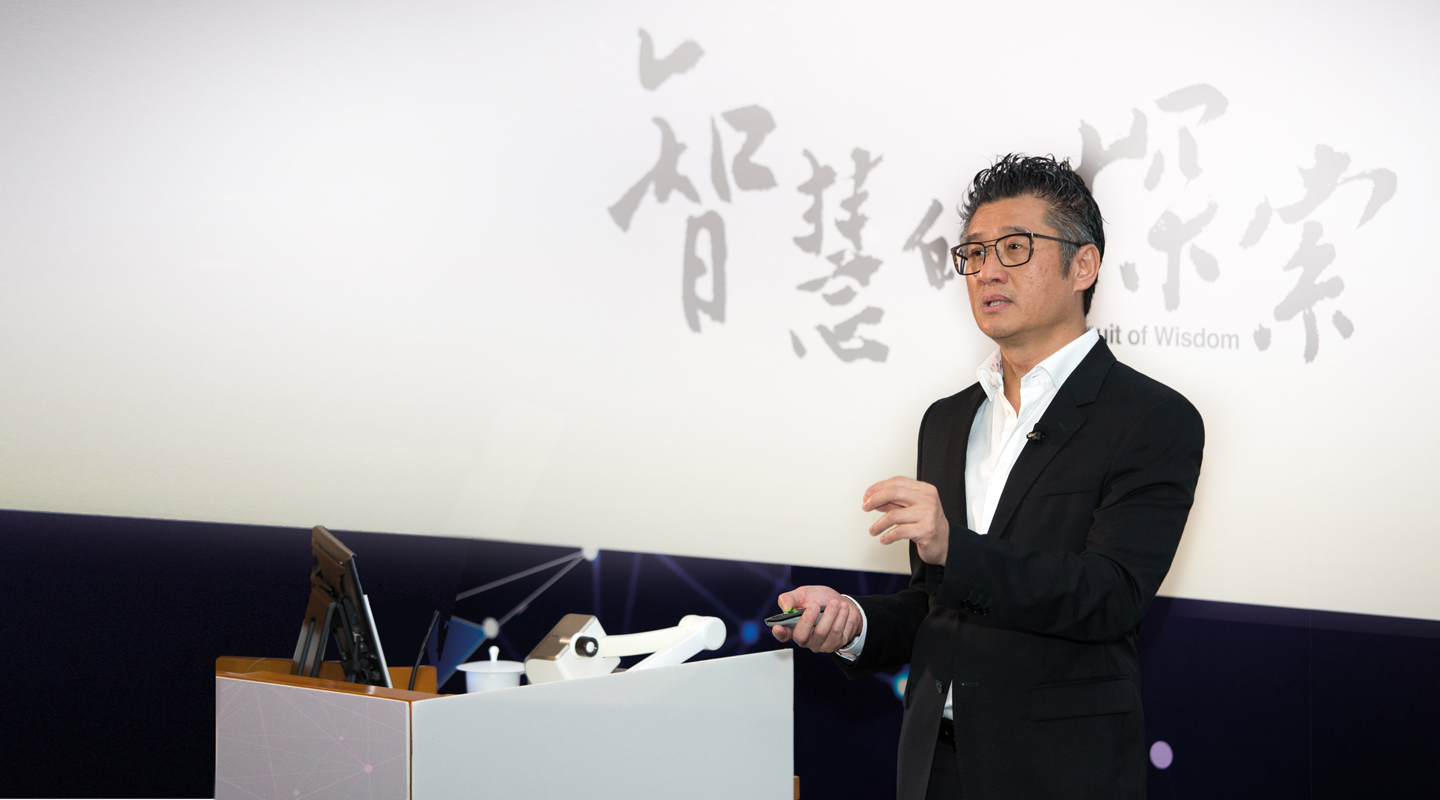Dear readers, With the launch of e-newsletter CUHK in Focus, CUHKUPDates has retired and this site will no longer be updated. To stay abreast of the University’s latest news, please go to https://focus.cuhk.edu.hk. Thank you.
And Miles to Go before I Sleep
Tony Mok on the quest to defeat cancer

The long and winding road
That leads to your door
Will never disappear
I’ve seen that road before
It always leads me here
Lead me to your door
—The Beatles, ‘The Long and Winding Road’
To live is to embark on all sorts of journeys, willingly or not. For the unfortunates, one of these journeys is that of fighting cancer. Adopting the title of a song by The Beatles, Prof. Tony Mok, Chairman of the Department of Clinical Oncology and the Li Shu Fun Medical Foundation Professor of Clinical Oncology, gave the talk ‘The Long and Winding Road to Conquer Cancer’ on 14 October. The talk marked the end of ‘The Pursuit of Wisdom’ public lecture series, an event celebrating CUHK’s 55th anniversary. With his iconic, debonair demeanour, Professor Mok shed light for a fascinated audience on how medical professionals walk with patients on the road to overcoming cancer.
What Does It Mean to ‘Conquer Cancer’?
Professor Mok began by unpacking the concept of ‘conquering’ cancer. It can mean getting rid of the disease, but it also means preventing and controlling it. Certainly, though, they all point to the idea of extending the patient’s life. He first dealt with prevention and noted that it comes in a primary kind and a secondary one: the former aims at stopping cancer from happening, while the latter is about early diagnosis. Focusing on lung cancer, his area of expertise, he named tobacco control as the main preventive measure since the mid-20th century and regulating e-cigarettes as the latest front; in the unfortunate case of having the disease, one will benefit from an X-ray or more so, a CT scan, through which the disease may be detected and treated at an early stage. Recently, experts have also discovered that nasopharyngeal cancer can be diagnosed early on through blood tests, though for now this method does not work with all types of cancer.
Professor Mok then illustrated the means of getting rid of cancer. Tumour removals are one method, and since its verification some 70 years ago, cancer surgery has come a long way. Doctors can now operate with the help of robotic arms and therefore, with greater accuracy and efficiency—CUHK is well-regarded in Southeast Asia precisely for its robotic surgery. This can even be coupled with 5G technology and allow surgeons to operate from a distance in real time using robots. However, Professor Mok pointed out that it is still impossible to detect small tumours and thereby remove them. Also, cancer cells could have migrated via blood vessels before a tumour is resected. For these reasons, surgery must come with chemotherapy. Researchers are looking into using the patient’s own immune system to eradicate any remaining cancer cells.
Lastly, Professor Mok explicated the ways of controlling and living with cancer. Apart from chemotherapy, there is precision medicine, which is more effective while having fewer side effects. Stymieing tumour growth by attacking only genes causing cancer or simply, oncogenes, targeted drugs are one example of precision medicine. Another example is immunotherapy, which helps the immune system to identify and eliminate cancer cells. A way forward in cancer treatment, according to Professor Mok, might be giving immune cells the power to attack cancerous ones through the use of CRISPR.
The Car and the Driver
In his presentation, Professor Mok talked about cancer mainly from a technical angle; in the Q&A session, he clarified some commonly held conceptions of cancer with some apt analogies. A member of the audience said that one of his relatives was found to have a nodule in the lung through imaging. He was confused by the different interpretations of it by different doctors, some suggesting that it was benign and others, malignant. Professor Mok asked light-heartedly if the man had ever dated online. He then quipped, ‘Photos are unreliable.’ One should never come to a conclusion based solely on appearance or any single factor, he cautioned.
With this analogy Professor Mok made us see that however advanced our medicine has become, there must be professionals who are serious about their work to harness it. Another member of the audience asked if ordinary people can benefit from the cutting-edge technology highlighted in the presentation through the public health system. Professor Mok answered with another analogy, ‘The same car can go either painfully slow or incredibly fast—depending on who’s driving it.’ He suggested that the technology is available at public hospitals; what must follow is the dedication of the people—medical professionals—who use it.
Promises to Keep
Professor Mok had actually touched on the fact that the people are every bit as important as the technology in his explication of targeted therapy. Targeted drugs are, after all, the hard work of scholars who tirelessly searched for oncogenes. Cruising on the long and winding road to a solution to cancer or indeed, any kind of knowledge, scholars must be driven by a strong will to reach the gate of wisdom.
Jason Yuen
This article was originally published in No. 546, Newsletter in Nov 2019.